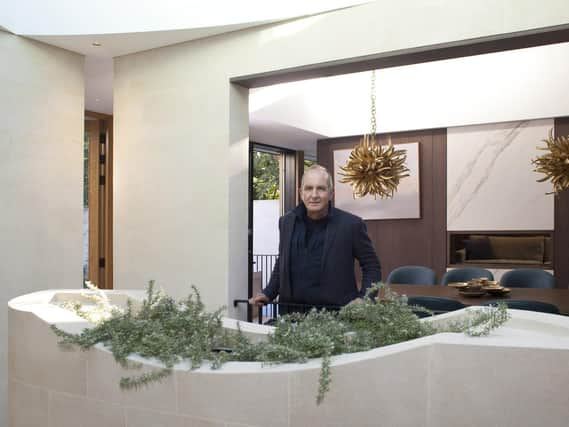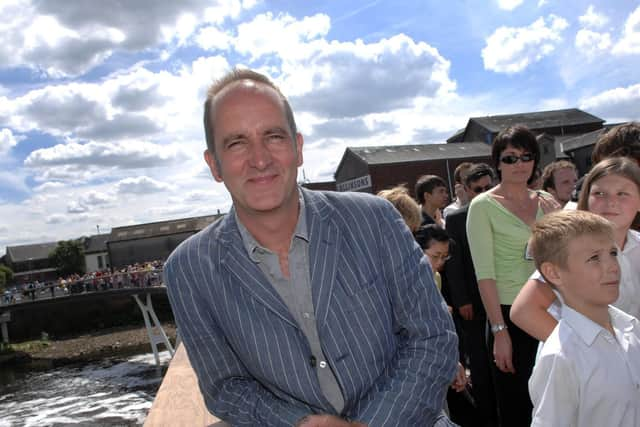Kevin McCloud on the new series of Grand Designs and filming during the Covid-19 pandemic


Kevin McCloud has – by his own admission – got quite good at being rude during the Covid-19 pandemic.
The Bedfordshire-born presenter and designer, 61, says he is in a vulnerable group and so is “very, very wary about spending time with other people”.
Advertisement
Hide AdAdvertisement
Hide AdIn fact, if somebody gets too near him in public, he will happily say to them: “Excuse me, what do you think you’re doing? Be Covid compliant!’”


“I’m quite bad walking down the street now; I tell people off,” he quips. “I can be completely anonymous in a hat and a mask…”
McCloud began filming the latest series of Bafta-winning Grand Designs – which he has presented since it first aired in 1999 – back in June.
They’ve got “massive Covid compliance” on set “and that’s partly driven by me”, he says.
Advertisement
Hide AdAdvertisement
Hide Ad“We’ve developed a protocol for all the various places, whether we’re filming in a building or outside, quite diligently,” adds the inimitable TV personality and writer.
“We have Covid compliance officers with us at all times, making sure we are all being good.”
Grand Designs follows ambitious people across the UK who have set out to pursue their vision of a dream house by building it themselves.
The projects are usually incredibly impressive feats of architecture, focusing on modern design, energy efficiency, maximising space, and views.
Advertisement
Hide AdAdvertisement
Hide AdThe challenge with filming the show in Covid times is that everything they do for the show “involves human beings”, McCloud reflects.
Interviews with contributors that he normally conducts at a 3ft distance are now being done three metres apart, every move in front of the camera is thought about, and “within all that, you’ve still got to find the spontaneity of the conversation and the fun”, he notes.
Asked about the highlights of the new episodes, the father-of-four teases there is a clash of opinions – “not exactly fisticuff moments” – with a couple who are converting an ancient biscuit mill into a house.
“They kind of go to it with a bit too much brio. My view is, a historic building’s character is basically made up of thousands and thousands of details of what it is, and if you start rooting out a little bit, before you know it, weirdly you’ve ripped out everything and you’ve lost the character.
Advertisement
Hide AdAdvertisement
Hide Ad“And then you start to try and put it back in and it suddenly looks like a Disney version of what it was.”
He continues candidly: “I had my misgivings about what they were going to do right from the very beginning, so I just said to my producer, ‘Look, I’ll just say what I think’. He said ‘Great, do that!’ I enjoy being let off the leash sometimes.”
In the mid-2000s, McCloud was involved in The Castleford Project, one of the world’s first televised regeneration schemes.
From 2003, he collaborated with residents, Wakefield Council, architects and regional and national funding agencies on several community-led improvement projects totalling £11m.
Advertisement
Hide AdAdvertisement
Hide AdThese included the construction of the Millennium Bridge, a 130 metre route between Castleford town centre at one side of the River Aire and homes and businesses on what is locally known as ‘‘Duck Island’’ at the other, a new town square and a play forest.
The “urban regeneration experiment”, as it was deemed, was captured on camera for Channel 4 and a four-part series charting the restoration – Kevin McCloud and the Big Town Plan – aired in August 2008, just after the project’s completion.
“In theory, this experiment might encourage big investment from outside,” McCloud explained in the first episode. It could make Castleford a thriving town where people want to spend the money they earn, somewhere they want to stay and bring up their families. If it all works it will give this town a future. It will show other towns what’s possible. “But if it fails, Castleford will just wither away.”
McCloud is no stranger, of course, to bold projects. But his latest Grand Designs series goes beyond architecture and building design, featuring an “incredibly moving story of youth and illness … and the enormous kind of life-affirming dedication and commitment that people put into projects when they are suffering, or have suffered from, illness”.
Advertisement
Hide AdAdvertisement
Hide AdHe’s talking about a young couple who met because they both had brain tumours in their teens, and who are now married and “hugely in love”.
“Basically, the entire film is a poem, it’s a love song, between them about what they want and making something for themselves to share knowing that time is incredibly precious.
“I get emotional just thinking about it because they were a lesson to so many people who fret about the colour of their kitchen cabinets or get obsessed about having that particular brand of bifold doors or whatever it is.
“Actually, when you look at it over time and with a long view you think ‘What a complete ridiculous waste of energy’.”
Advertisement
Hide AdAdvertisement
Hide AdStories of people like that, young people, perhaps seem even more poignant now because we all had time in 2020 to re-evaluate what’s important in life, I suggest.
“And so many of us have lost loved ones or have worried about losing loved ones and, just as we all need a film, a binge-watch, a soap opera, something to take us away from the day to day, all of us also realise that we shouldn’t get too obsessed about things that don’t matter – the superficial,” says McCloud.
“We’ve all come to realise how important loved ones are, and time spent with them, and how actually, what matters is living life, not just planning it, not just dreaming – getting on and living it.”
When we chat it’s not long after the November lockdown has ended, and he muses the pandemic has also made us think more about design.
Advertisement
Hide AdAdvertisement
Hide Ad“Ordinarily our houses don’t get stressed – but in lockdown, suddenly they have,” he elaborates. “Suddenly, we feel imprisoned, suddenly we need somewhere where we can find privacy with our own thoughts, just an hour to ourselves.
“We need spaces to work, we need spaces to depressurise, to relax; kids need places to do their homework, to do home study. So, houses have started to really work hard, and we’ve all had to compromise one way or another.
“But it means that anybody building that house, or thinking about an extension, or maybe even just buying one of those garden rooms, thinks about them not just for indulgent purposes, but actually for some really functional roles.”
Grand Designs returns to Channel 4 on Wednesday, January 6.
Support The Yorkshire Post and become a subscriber today. Your subscription will help us to continue to bring quality news to the people of Yorkshire. In return, you'll see fewer ads on site, get free access to our app and receive exclusive members-only offers. Click here to subscribe.
